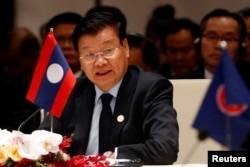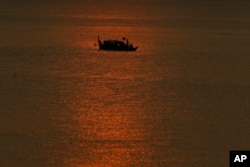Presented with "frightening" possibilities due to intense damming, the leaders of the Mekong River Commission member countries gave little sign Thursday they had heeded calls to rethink a fundamental water policy for the shared waterway, with the exception of Vietnam.
At the third MRC Summit in Siem Reap, Cambodia, prime ministers of the four member countries that share the river responded to a six-year, comprehensive study by the body's council that warned of severe consequences if all currently planned dams go ahead.
Among the most alarming findings from their modeling was a potential 97 percent loss of sediment flow to the Mekong Delta by 2040 if current development plans proceed in full.
Vietnamese Prime Minister Nguyen Xuan Phuc called for a serious response, telling the summit the Mekong's "ecosystem and environment are seriously deteriorating."
"The protracted drought, saline intrusion, the erosion of coast lines and riverbanks and land subsidence, [means] the livelihoods of over 20 million people are under threat," he said.
"Therefore," he added, "we need to take concrete and timely action to ensure that the Mekong Basin Delta will continue to develop and work as a major rice supplier for regional food security as it has been the rice bowl and fishing grounds of the region for hundreds of years."
Scientists at the summit had made it clear there was a "pressing demand" to restructure agriculture methods and embrace increasingly competitive renewable technologies such as wind and solar, he said.
"All these negative signs are more prominent and severe in the Lower Mekong Basin, especially the Mekong Delta, Vietnam in particular," he said.
The 3,600 page study found that summit host Cambodia would also face particularly adverse consequences from continued damming of the river because so many of its people relied on fish as a source of nutrition.
The country's prime minister, Hun Sen, made no reference to hydro power in his opening speech, instead emphasizing "challenges such as population growth, rapid development and the increasing need for for water, food and energy security."
Thongloun Sisoulith, the prime minister of Laos, which is building and planning some of the river's most controversial mainstream dams, including the Xayaburi and the Don Sahong, pledged to keep his word and ensure hydropower projects were built sustainably.
Thai junta leader and nominal Prime Minister Prayuth Chan, whose country stood to lose more than half its fish biomass by 2040 in at least two of the study's scenarios, also neglected to make any mention of dams.
He instead focused on greater MRC collaboration in tackling climate change, declaring his country managed water policy effectively.
Earlier in the week scientists, researchers and civil society groups spent two days analyzing the results of the vast MRC council study.
Deemed credible by the U.S. Geological Survey despite a lack of peer review, the study examined a range of different scenarios based on the degrees to which current development plans submitted by riparian countries are implemented.
Climate change and severe drought adjusted scenarios also were modeled.
It found the whole Lower Mekong Basin - the world's most productive fishery - could lose between 39 and 40 percent of its entire fish biomass, some 900,000 tons, worth about $4.3 billion by 2040 if development plans went ahead unchanged. Other recent surveys have put this figure considerably higher.
White fish — which designates species that migrate over hundreds of kilometers — would be particularly badly hit and become dominated by invasive species, the researchers found.
"So by 2040 if all the 11 dams installed plus the Chinese [and other] tributary dams, you can see in Thailand, in Laos, all these white fish disappear," So Nam, the MRC Secretariat's Chief Environment Management Officer, said on the sidelines of the summit, later clarifying that minute quantities of white fish might survive in these countries.
Billions had been spent to no avail to try and get rid of invasive species, such as Chinese carp, Indian carp and Tilapia in Australia and the U.S., he warned.
"So it's really a frightening situation, not only from the dam but also from another human activity of stocking introduced species," So said.
Current Mekong development plans would, however, see substantial increases in agricultural profits in countries such as Cambodia, the study found.
Nguyen Thi Ngoc Minh, a specialist at the MRC, said this actually would result in a substantial reduction of projected GDP growth, though, because labor would need to be diverted from higher income industries, such as manufacturing and services.
"It's quite consistent in terms of the potential reduction in the GDP values in Cambodia of, I would say, around 20 percent compared to the baseline," she said.
By 2040 GDP growth potential was predicted to drop by billions of dollars for all member countries except Vietnam.
Hydropower profits were found to exceed fisheries losses though the report's authors themselves said those predictions were based on already outdated price assumptions.
Questions were repeatedly raised by summit participants about the financial viability of hydropower against increasingly cheap solar and wind alternatives.
Thailand recently delayed a decision to purchase power from the Thai-Chinese backed Pak Beng dam on the Mekong Mainstream in Laos - a development some conservationist have called a tipping point for the financial viability of hydropower.









